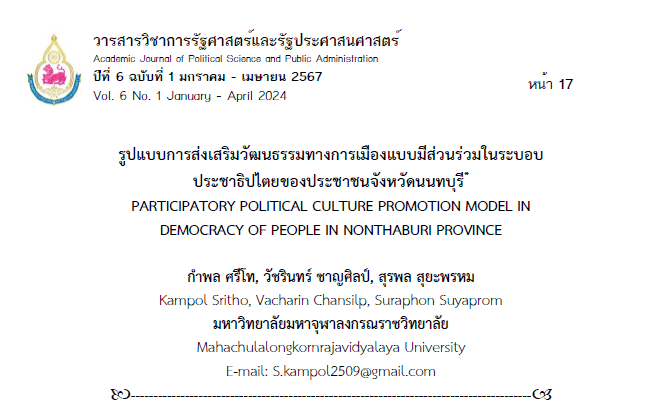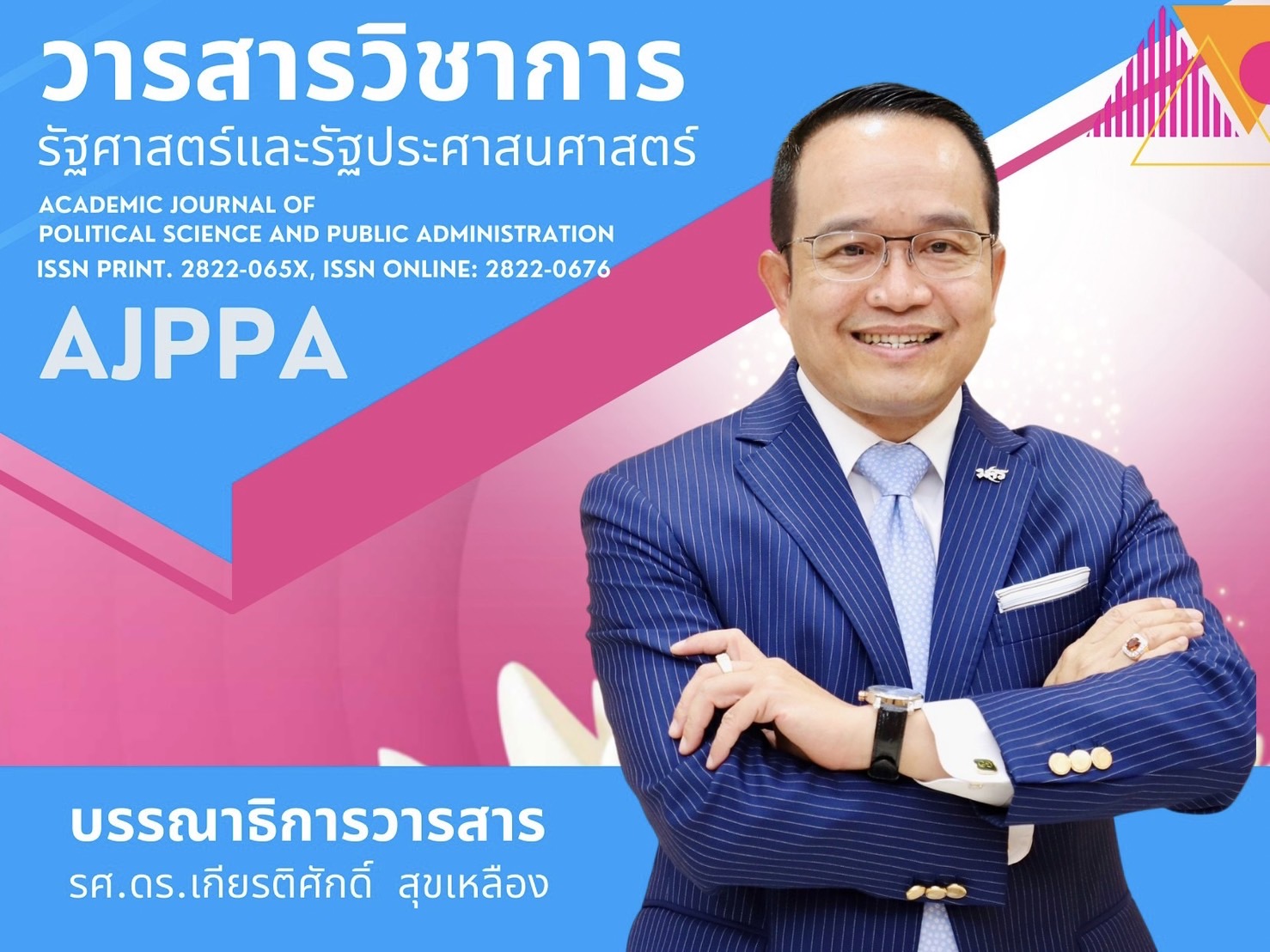รูปแบบการส่งเสริมวัฒนธรรมทางการเมืองแบบมีส่วนร่วมในระบอบประชาธิปไตยของประชาชนจังหวัดนนทบุรี
คำสำคัญ:
รูปแบบการส่งเสริม, วัฒนธรรมทางการเมืองแบบมีส่วนร่วม, ระบอบประชาธิปไตยบทคัดย่อ
บทความวิจัยนี้มีวัตถุประสงค์เพื่อศึกษาสภาพทั่วไปของวัฒนธรรมทางการเมืองแบบมีส่วนร่วมในระบอบประชาธิปไตยของประชาชนจังหวัดนนทบุรี เพื่อศึกษาปัจจัยที่ส่งผลต่อวัฒนธรรมทางการเมืองแบบมีส่วนร่วมในระบอบประชาธิปไตยของประชาชนจังหวัดนนทบุรี และเพื่อนำเสนอรูปแบบการส่งเสริมวัฒนธรรมทางการเมืองแบบมีส่วนร่วมในระบอบประชาธิปไตยของประชาชนจังหวัดนนทบุรี โดยประยุกต์หลักอปริหานิยธรรม 7 เป็นรูปแบบการวิจัยแบบผสานวิธี การวิจัยเชิงคุณภาพใช้วิธีการสัมภาษณ์ การวิจัยเชิงปริมาณใช้แบบสอบถาม เก็บข้อมูลจากกลุ่มตัวอย่าง จำนวน 400 คน โดยคำนวนจากสูตรของทาโร่ยามาเน่ วิเคราะห์ข้อมูลโดยหาค่าความถี่ ค่าร้อยละ ค่าเฉลี่ย ส่วนเบี่ยงเบนมาตรฐานและวิเคราะห์การถดถอยพหุคูณ
ผลการวิจัยพบว่า 1. สภาพทั่วไปของวัฒนธรรมทางการเมืองแบบมีส่วนร่วมในระบอบประชาธิปไตยของประชาชนจังหวัดนนทบุรี ภาพรวมอยู่ในระดับปานกลาง 2. ปัจจัยที่ส่งผลต่อวัฒนธรรมทางการเมืองแบบมีส่วนร่วมในระบอบประชาธิปไตยของประชาชนจังหวัดนนทบุรี พบว่า กระบวนการกล่อมเกลาทางการเมือง มี 5 ด้าน คือ ด้านสถาบันสื่อมวลชน ด้านสถาบันการศึกษาหรือโรงเรียน ด้านกลุ่มเพื่อน ด้านสถาบันทางการเมือง ด้านสถาบันครอบครัว และหลักอปริหานิยธรรม 7 มี 6 ด้าน คือ ด้านรักสันติภาพ ขัดเกลาจิตใจอยู่เสมอ ด้านพร้อมเพรียงกันประชุม ด้านปฏิบัติตามกฎข้อบังคับ ด้านตั้งใจสนับสนุนคนดีและปกป้องคนดี ส่งเสริมคนดี ด้านไม่ลุแก่อำนาจความอยากความเห็นแก่ตัว ด้านเคารพนับถือผู้ใหญ่ มีนัยสำคัญทางสถิติระดับ 0.01 และ 3. นำเสนอรูปแบบส่งเสริมวัฒนธรรมทางการเมืองแบบมีส่วนร่วมในระบอบประชาธิปไตยของประชาชนจังหวัดนนทบุรี โดยประยุกต์หลักอปริหานิยธรรม 7 ประกอบด้วย ด้านพร้อมเพรียงกันประชุม พร้อมเพรียงกันเลิกประชุม ด้านปฏิบัติตามกฎข้อบังคับ ด้านเคารพนับถือผู้ใหญ่ ด้านไม่ลุแก่อำนาจความอยากเห็นแก่ตัว ด้านรักสันติภาพขัดเกลาจิตใจอยู่เสมอ และด้านตั้งใจสนับสนุนคนดี ปกป้องคนดี ส่งเสริมคนดี
เอกสารอ้างอิง
จักษ์ พันธ์ชูเพชร. (2549). การเมืองการปกครองไทย. กรุงเทพฯ: พั๊นซ์กรุ๊ป.
ทินพันธ์ นาคะตะ. (2543). การเมืองการบริหาร : ภาระของชาติ. กรุงเทพฯ: สหายบล็อกและการพิมพ์.
ธนาภรณ์ โง้วเจริญ และวัชรินทร์ ชาญศิลป์. (2560). วัฒนธรรมทางการเมืองแบบประชาธิปไตยของนักเรียนโรงเรียนศรีมหาโพธิ์ จังหวัดปราจีนบุรี. วารสารรัฐศาสตร์ปริทรรศน์ มหาวิทยาลัยเกษตรศาสตร์, 4(1), 133–147.
พนารัตน์ มาศฉมาดล. (2560). การมีส่วนร่วมของประชาชนตามรัฐธรรมนูญแห่งราชอาณาจักรไทย.สืบค้น 31 กรกฎาคม 2566, จาก http://wiki.kpi.ac.th/index.php?title=การมีส่วนร่วมของประชาชนตามรัฐธรรมนูญแห่งราชอาณาจักรไทย_พุทธศักราช_2560.
พรอมรินทร์ พรหมเกิด. (2557). วัฒนธรรมทางการเมืองกับการพัฒนาประชาธิปไตยในเขตชนบทอีสาน : กรณีศึกษาประชาชนในเขตหมู่บ้านคำบงและหมู่บ้านสะอาด อำเภอน้ำพอง จังหวัดขอนแก่น. วารสารมนุษย์ศาสตร์สังคมศาสตร์ มหาวิทยาลัยขอนแก่น, 31(3), 64-95.
พระมหาชัยทัต ขันธสิกรรม. (2556.) ความสัมพันธ์ของหลักภิกขุอปริหานิยธรรม 7 กับการบริหารวัดในเขตบางพลัด กรุงเทพมหานคร. วารสารเผยแพร่ความรู้ทางวิชาการและงานวิจัย, 21(5), 53-63.
พรสวรรค์ สุตะคาน. (2558). การกล่อมเกลาทางการเมืองและวัฒนธรรมทางการเมืองแบบประชาธิปไตยที่ส่งผลต่อการมีส่วนร่วมทางการเมืองของประชาชนเขตภาคตะวันออกเฉียงเหนือตอนล่างของประเทศไทย. วารสารวิชาการ มหาวิทยาลัยการจัดการและเทคโนโลยีอีสเทิร์น, 12(2), 45-60.
อุดม พิริยะสิงห์. (2529). การเมืองเบื้องต้น. มหาสารคาม: ภาควิชารัฐศาสตร์ คณะสังคมศาสตร์ มหาวิทยาลัยศรีนครินทรวิโรฒ มหาสารคาม

ดาวน์โหลด
เผยแพร่แล้ว
รูปแบบการอ้างอิง
ฉบับ
ประเภทบทความ
หมวดหมู่
สัญญาอนุญาต
ลิขสิทธิ์ (c) 2024 วารสารวิชาการรัฐศาสตร์และรัฐประศาสนศาสตร์

อนุญาตภายใต้เงื่อนไข Creative Commons Attribution-NonCommercial-NoDerivatives 4.0 International License.




